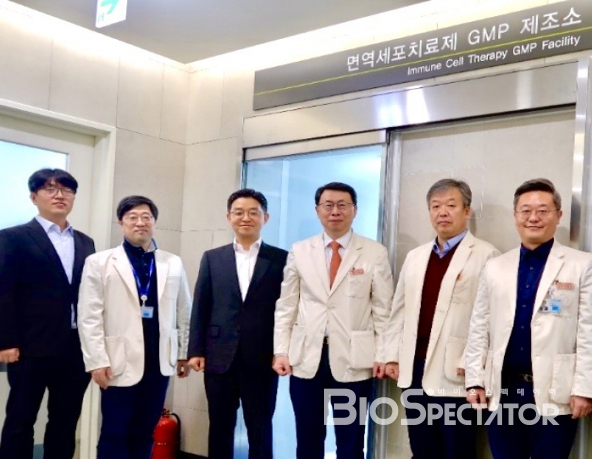기업
Curocell, new GMP facility for entering '2nd Gen CD19 CAR-T' by this year
바이오스펙테이터 Sungmin Kim 기자
Established its GMP facility with a size of 500 ㎡ for producing 'CAR-T' inside the Research Institute for Future Medicine of Samsung Seoul Hospital and secured the manufacturing capacity for an annual

Curocell, the first domestic biotech specialized in CAR-T, completed the construction of a production facility for clinical trial of the next generation CD19 CAR-T with improved efficacy compared to the existing CD CAR-T products such as Kymriah and Yescarta.
Curocell announced on February 11 that it completed the construction of GMP facility for producing immune therapies inside Samsung Seoul Hospital. The newly completed GMP facility with a size of 500 ㎡ is located inside the Research Institute for Future Medicine of Samsung Seoul Hospital, which is expected to produce immune therapies for an annual number of 100 patients.
Through this, Curocell has established a closer cooperation relationship with Samsung Seoul Hospital with which the company has concluded an agreement on cooperation in clinical development. Also, it is meaningful that it is a case of cooperation between a biotech company and a general hospital to overcome incurable diseases with state-of-the-art medical technology.
CAR-T is an innovative treatment with a high remission rate of 80% after the administration of a single dose to patients with terminal malignant B cell carcinoma without any appropriate alternative. CAR-T is characterized as a gene cell therapy that requires genetic manipulation to be customized to each patient. The completion of the construction set an important milestone in that securing manufacturing capacity in the critical development and commercialization processes of CART-T. There has been no clinical trial of CAR-T in Korea, and there are only a few companies that have the state-of-the-art GMP facilities.
At the GMP facility that Curocell has built inside Samsung Seoul Hospital, immune cells collected from patients undergo genetic manipulation, mass culturing, and quality test (QC) to produce autologous CAR-T product tailored to each patient. Curocell has its own process team, analysis team, and clinical team. The company introduces the latest equipment to build a semi-automation process and uses a closed system to minimize the exposure to air in the manufacturing process of the product. The manufacturing process is simplified to enhance stability, reliability and efficiency and to minimize product contamination.
Phase 1 clinical trial on the next generation CD19 CAR-T will be led by the faculty of the department of hematology and oncology at Samsung Seoul Hospital. In the second half of this year, Curocell plans to submit an IND filing to the Ministry of Food and Drug Safety to evaluate the safety and efficacy of the next-generation CD19 CAR-T on patients with terminal-stage lymphoma.
Especially considering that CAR-T treatments need to be transported and supplied to patients after manufacturing, if a GMP facility is located inside a clinical trial institution, the short physical logistical route can facilitate the supply. In addition, a close cooperation with the hospital and the possibility of various types of CAR-T clinical trials in the future will work out favorably.
CEO Gunsoo Kim of Curocell said, "A pharma company's new drug development capability as well as a large hospital's outstanding clinical trial capacity are essential for a successful development of cutting-edge immune cell therapy products. Curocell expects to prove the value of its innovative immune therapy product through close cooperation with Samsung Seoul Hospital with the best clinical trial capability in South Korea."
In the meanwhile, the OVIS ™ (OVercome Immune Suppression) platform technology is applied to the next-generation CD19 CAR-T currently under development by Curocell to overcome the immunosuppression of T cells in the tumor microenvironment.

















